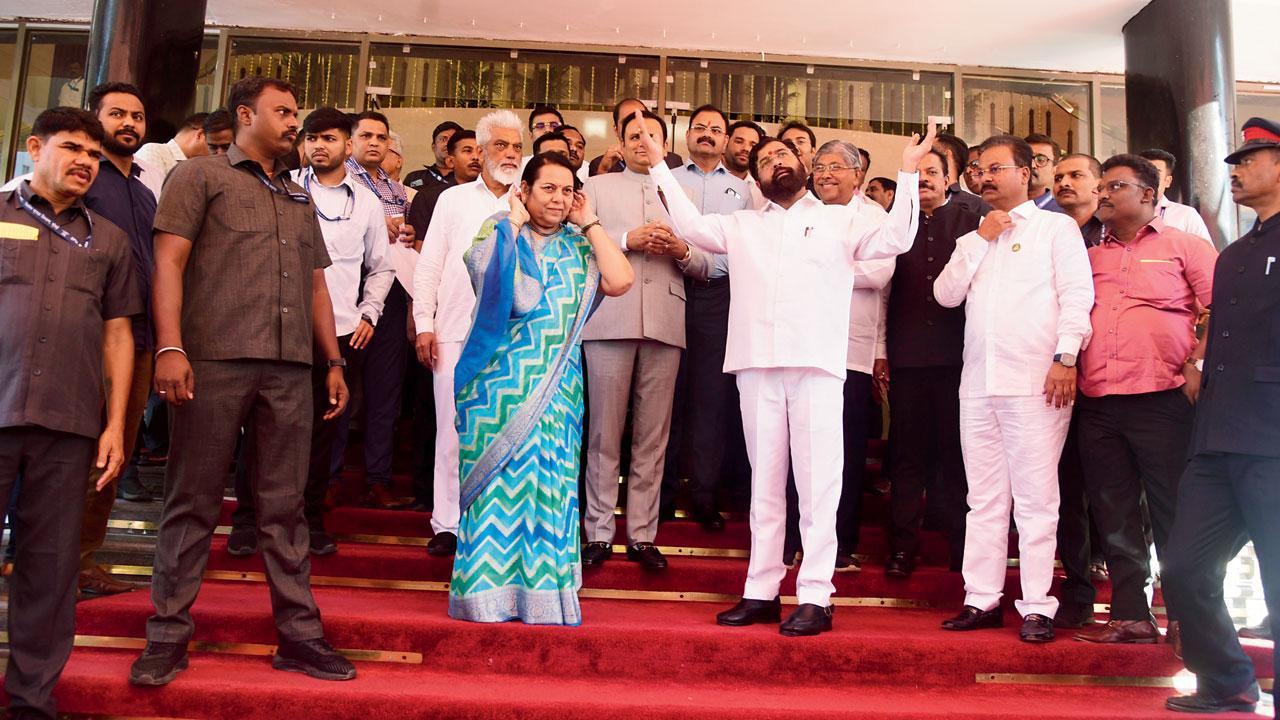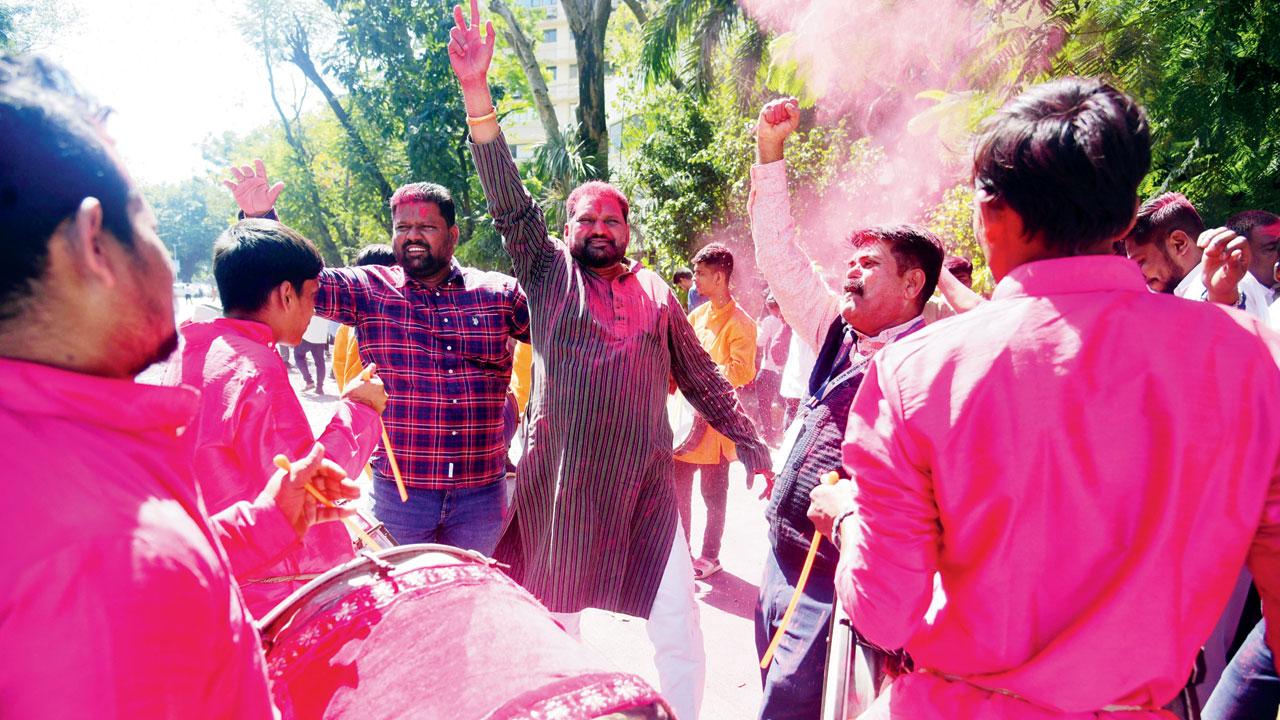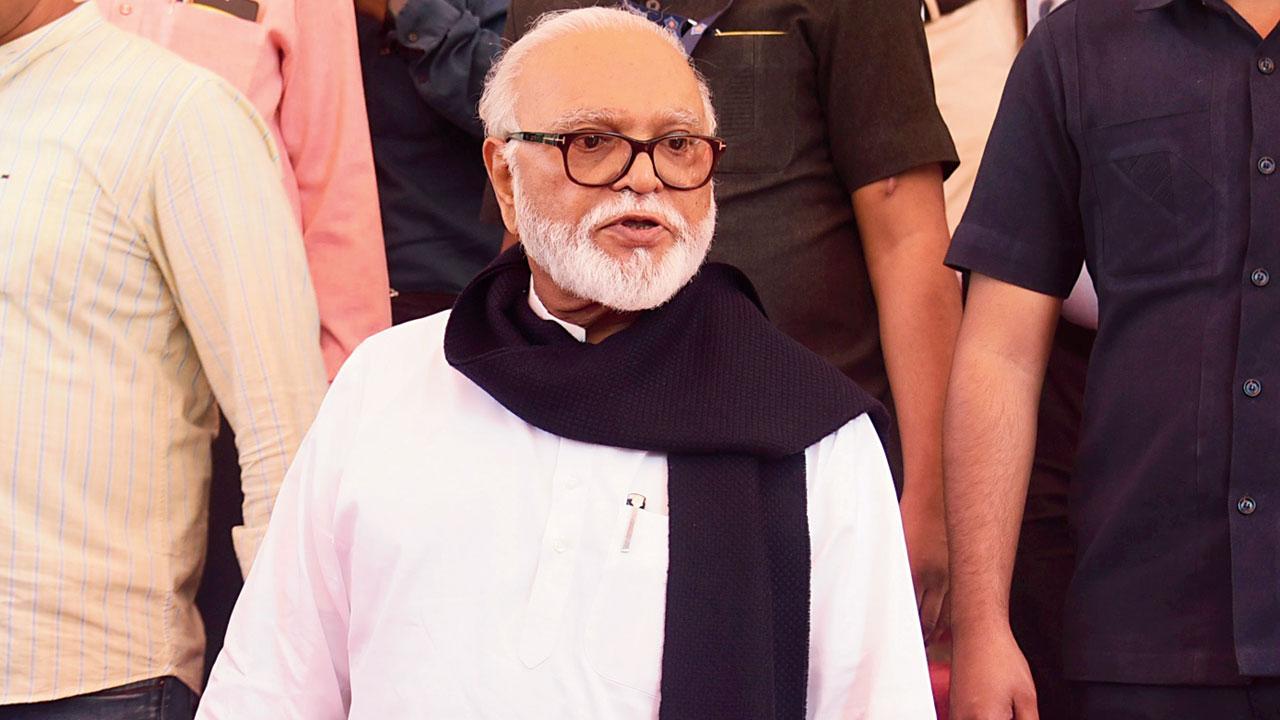Activist reinstates demand for Kunbi certificate for the blood relatives of Marathas who already have certification, which will give them a share in the OBC quota, adding he will take call on fresh protests today

Chief Minister Eknath Shinde surrounded by ministers after the special session on Maratha reservation at Vidhan Bhavan on February 20. Pic/Atul Kamble
Key Highlights
- Shinde told Assembly that separate 10 per cent Maratha quota will stand legal test
- Manoj Jarange Patil has already expressed his displeasure
- Quota for Marathas has been struck down twice by the courts
While Chief Minister Eknath Shinde told the Assembly he is confident that the separate 10 per cent Maratha quota, a bill for which was passed on Tuesday, will stand the test of law, community leader Manoj Jarange Patil has already expressed his displeasure and doubled down on his demand for reservations strictly inside the OBC net. Quota for Marathas has been struck down twice by the courts, and Jarange fears the Shinde bill will face the same fate. The law to give the Maratha community a separate quota of 10 per cent in education and jobs was unanimously passed by the Maharashtra legislature a law on Tuesday. This is the third such attempt since 2014; the courts had rejected similar legislation twice before.
Following intense protests led by a low-profile Maratha quota activist Manoj Jarange Patil, who hardly called shots six months ago, a special one-day sitting of the legislature was called on Tuesday ahead of the budget session. Tabled by Chief Minister Eknath Shinde, the draft bill was approved unanimously without a debate in both houses. An independent category—the Socially and Educationally Backward Classes (SEBC)—has been created for Marathas, thus taking overall reservations in Maharashtra beyond a permissible 50 per cent.

Members of the Maratha community celebrate the passing of the bill on Tuesday. Pics/Atul Kamble
Ahead of the 2014 elections, the outgoing Prithviraj Chavan government had given Marathas a 16 per cent quota. It had also extended a five per cent quota to Muslims in the same legislation. But the law met a legal hurdle, following which the Devendra Fadnavis government brought about the SEBC Act in 2018 to give Marathas a 16 per cent quota in jobs and education.
The Bombay High Court upheld the validity of the law but reduced the quantum in jobs to 13 per cent, and 12 per cent in education. The law was challenged in the Supreme Court. The apex court pointed out deficiencies in the law while scraping it. The MVA government was in power then. The subsequent NDA sarkar faced the Maratha stir again.
CM Shinde told the legislature that the new law would stand challenges because the deficiencies were rectified by the legal experts and the Maharashtra State Backward Class Commission.
Permanent solution: CM
He said the government has fulfilled a commitment not to impact the OBC quota. “The exercise undertaken by the commission wasn’t a sample survey but a detailed survey of over 2.5 crore families. The empirical data thus collected has established the backwardness of the Maratha community. It has also been proven that exceptional circumstances prevail [to breach a cap of 50 per cent]. There are 22 states that have crossed the permissible limit,” he said. Shinde said the demand for the Kunbi certificates would also be fulfilled but not in haste. “The notification has been issued. We have received some six and a half lakh suggestions and objections in this matter. The department will need time to see the response,” he added.

Chhagan Bhujbal, minister of food, civil supplies and consumer protection at the Vidhan Bhavan after the special session
DyCM Devendra Fadnavis, who has gone through the legality when he was the CM, told reporters that the law would last in the court. “The backward class commission led by Justice (retd) Shukre was given a mandate after a panel of Chief Justice Dilip Babasaheb Bhosale (retd), studied the deficiencies that were pointed out by the SC. It was his report that made terms of reference for the backward class commission. The law will last in court,” he said, adding that in the process the OBC quota was not harmed.
Give us OBC quota: Jarange
The law did not satisfy the Maratha activist Jarange Patil. He fumed against the CM over his statement on suggestions and objections in the notification. He asked for immediate action in the community’s demand for the Kunbi certificate for the blood relatives (sage soyare) of the Marathas who already have availed of such certification that gives them a share in the OBC quota. “It is our legitimate demand. You can’t give an excuse.
Increase manpower to go through the suggestions and objections. We don’t want a separate quota and a law that two-three people [in the government] want. Our demand is for a quota within an overall limit of 50 per cent. We don’t think the court will approve of the new law. We will decide on a new protest on Wednesday,” he said in his village Antarwali Sarati.
Doubts on certification
In a media conference later in the day, OBC leader and minister Chhagan Bhujbal produced some disputed documents that purportedly were used for getting the Kunbi certificate. He said the Marathas should not be given a double benefit—a 10 per cent quota and a share in the OBC quota. In the house, he came down heavily on Jarange Patil before he was asked to wind up. “Why continue the protest when a new law has been passed? An atmosphere of fear has been created. I was also threatened for speaking for the OBCs,” he said.
Cheating, says Wadettiwar
Opposition leader in the Assembly Vijay Wadettiwar told the CM in the house that the law would be passed not by majority but unanimously, but outside the house, he called it an election jumla. He wondered whether a law which was scrapped twice before would get the court’s approval.
“We are not opposed to a separate quota for Marathas,” he said before the Speaker put up the bill for approval of the house. Later, the bill was passed in the upper house. However, outside the house, the opposition leader said the MVA did not oppose the legislation because their criticism could have led to a campaign that they were against the Marathas. “This law is cheating ahead of the elections. The state has no authority to give such a reservation,” he added.
Shiv Sena (UBT) chief Uddhav Thackeray echoed Wadettiwar’s sentiments, but wished that the reservation would stand in the court. “Considering past experiences and the study that has been done thereafter, I’m sure that the quota will pass legal scrutiny because they said that they have accepted and worked on the recommendations of Chief Justice Bhosale who was appointed when I was the CM,” he said, adding that there was no need for inflicting atrocities against the Maratha activists in Antarwali Sarati.
Fadnavis dismissed the allegation. He said the government had been preparing for the law irrespective of the forthcoming elections. “We have been working on it for one and a half years. If Thackeray has said it [about the preparations], then I say that he too trusts our government…”
2018
Year SEBC Act was passed
Feb 20
Day special session was held
 Subscribe today by clicking the link and stay updated with the latest news!" Click here!
Subscribe today by clicking the link and stay updated with the latest news!" Click here!








